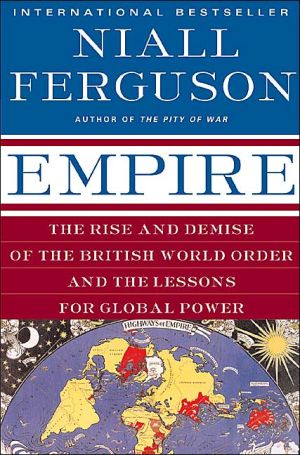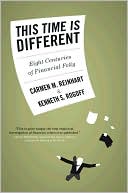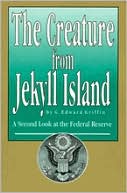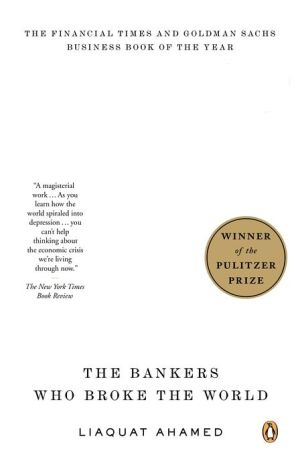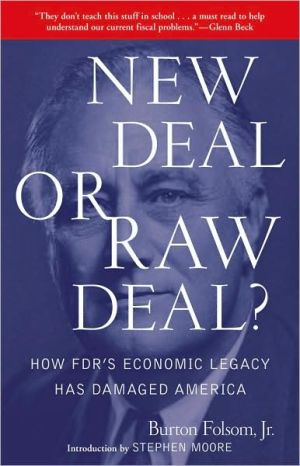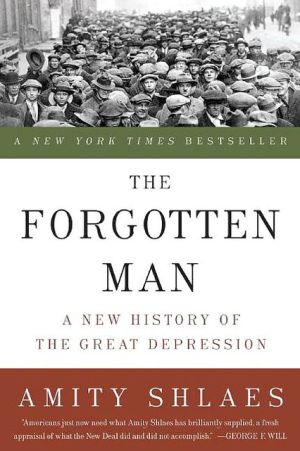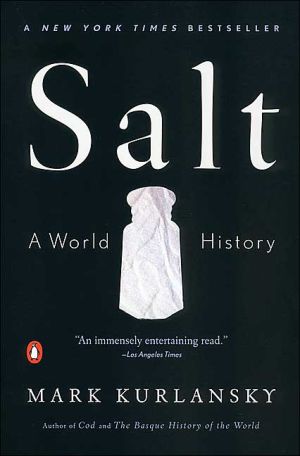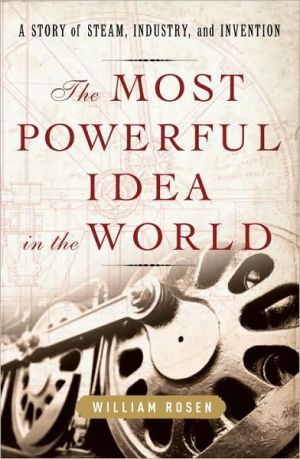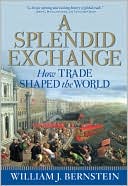Empire: The Rise and Demise of the British World Order
The British Empire was the largest in all history: the nearest thing to world domination ever achieved. By the eve of World War II, around a quarter of the world's land surface was under some form of British rule. Yet for today's generation, the British Empire seems a Victorian irrelevance. The time is ripe for a reappraisal, and in Empire, Niall Ferguson boldly recasts the British Empire as one of the world's greatest modernizing forces.An important new work of synthesis and revision, Empire...
Search in google:
A splendid history.... If Americans want to be convinced of the benefits of empire, as well as apprised of its costs, they need merely pick up Ferguson's dazzling book.-Weekly Standard The Washington Post Niall Ferguson, an eminent professor of political and financial history at Oxford and New York universities, brilliantly challenges the simplistic focus on racism, violence and exploitation. He asserts that on balance the British Empire was a good thing. Indeed, it played an essential role in making the modern world. — Daniel I. Davidson
\ From Barnes & NobleOn the eve of World War II, the British Empire covered more than 13 million square miles, one-fifth of the earth's surface. More than half a billion people lived directly or indirectly under British rule. It is perhaps not surprising that British historian Niall Ferguson sees this unprecedented empire as the world's first experiment in globalization and as a classroom that holds lessons for the ever-expanding American Empire. Both a synthesis and a revisionist study, Empire is a major historical work by the man whom The Independent called "unarguably Britain's brightest younger historian."\ \ \ \ \ David M. ShribmanA masterpiece for the moment, and perhaps longer.—David M. Shribman\ \ \ The New York TimesEmpire, it quickly becomes clear, is history with an agenda and a point of view — a book that, in its gung-ho defense of empire, is as devoid of measured objectivity as many recent, politically correct histories have been on the other side of the political spectrum. Mr. Ferguson — a professor of financial history at New York University, a senior research fellow at Jesus College, Oxford, and the author of earlier books including The Pity of War and Paper and Iron — is a wonderfully fluent writer, weaving telling details and vivid anecdotes seamlessly into his narrative. And yet he puts all this fine writing at the service of a decidedly dogmatic thesis, consistently trying to rationalize the injustices committed in the building of Britain's empire while accentuating what he sees as its positive contributions. — Michiku Kakutani\ \ \ \ \ The Los Angeles TimesGently in the book, and not so gently in some recent essays, Ferguson contends that the United States today would be advised to learn from the British Empire. Given the overwhelming power of the U.S., it is an imperial power whether it likes it or not, and Ferguson chides Americans for not embracing the burdens and responsibilities that come with such power. — Zachary Karabell\ \ \ \ \ The Washington PostNiall Ferguson, an eminent professor of political and financial history at Oxford and New York universities, brilliantly challenges the simplistic focus on racism, violence and exploitation. He asserts that on balance the British Empire was a good thing. Indeed, it played an essential role in making the modern world. — Daniel I. Davidson\ \ \ \ \ The Boston GlobeA masterpiece for the moment, and perhaps longer.—David M. Shribman\ \ \ \ \ The New York Times Sunday Book ReviewFerguson writes with his usual verve and takes a few swipes at sacred cows along the way. The American War of Independence was made by those who had benefited most from British rule. The United States, the heir to the British Empire in more than one sense, was fortunate, he argues, that the groundwork for its institutions was laid by Britain. And so are those parts of the world where the British implanted their culture. — Margaret MacMillan\ \ \ \ \ Publishers WeeklyAcclaimed British historian Ferguson (The Pity of War) takes the revisionist (or perhaps re-revisionist) position that the British Empire was, on balance, a good thing, that it "impos[ed] free markets, the rule of law... and relatively incorrupt government" on a quarter of the globe. Ferguson's imperial boosterism differs from more critical recent scholarship on the empire, such as Linda Colley's Captives (Forecasts, Dec. 2, 2002) and Simon Schama's A History of Britain: The Fate of Empire (Forecasts, Dec. 23, 2002). Ferguson's gracefully written narrative traces the history of the empire from its beginnings in the 16th century. As Ferguson tells it, by the 18th century British consumers had developed a strong taste for sugar, tobacco, coffee, tea and other imports. The empire's role was to supply these commodities and to offer cheap land to British settlers. Not until the late 18th century did Britain add a "civilizing mission" to its commercial motives. Liberals in Britain, often fired by religious feelings, abolished the slave trade and then set out to Christianize indigenous peoples. Ferguson gives a wonderful account of the fabled career of missionary and explorer David Livingstone. The author admits that the British sometimes responded to native opposition with brutality and racism. Yet he argues that other empires, especially those of Germany and Japan, were far more brutal (a not entirely satisfying defense). Indeed, Ferguson contends that Britain nobly sacrificed its empire in order to defeat these imperial rivals in WWII. His provocative and elegantly written account will surely trigger debate, if not downright vilification, among history readers and postcolonial scholars. 25 color illus., b&w illus., maps. (Apr.) Forecast: The young and attractive Ferguson is something of a celebrity in Great Britain, where he's been called "the Errol Flynn of British history"; so expect additional media attention. He currently teaches at New York University. Copyright 2003 Reed Business Information.\ \ \ \ \ Foreign AffairsThis big volume on "the rise and demise of the British world order and the lessons for global power" is really two books in one. The first (superbly illustrated) is a history of the British Empire and of the way in which it fostered what is now called globalization. This is a sweeping, partly analytic, partly anecdotal account that frequently shows the brutalities of empire and the inseparability of realpolitik, exploitation, greed, a sense of superiority, and a rhetoric of mission from the imperial enterprise. Much here is familiar, but the author's clear writing, his gift for narrative, and his way with words (such as the "Toryentalism" of Lord Curzon) make reading this ambitious synthesis a pleasure. The second book is more troubling. It is a defense of the British Empire for its contributions to world order — largely from the viewpoint of the imperialists — and as a lesson for the United Kingdom's mighty successor: the United States. Ferguson may be right in stressing how much British rule facilitated the spread of liberal capitalism around the world, how much worse other empires in the nineteenth and twentieth centuries turned out to be, how much the United Kingdom did for free trade, and so on. But the reasons why anticolonialism developed abroad and also at home are singularly absent from the picture. As for the British imperial example, Ferguson himself, in one paragraph, recognizes that "on close inspection, America's strengths may not be the strengths of a natural imperial hegemon": the United States "will always be a reluctant ruler of other peoples." Moreover, the miserable condition of millions in decolonized countries does not mean that they would prefer to liveagain under foreign rule. There are really two Fergusons here, just as there are two books. One is a brilliant economic historian. The other is a political writer who provokes his readers with very dubious theses — that the United Kingdom should have stayed out of World War I and that the British Empire should serve as a model for the new imperial America.\ \ \ \ \ Library JournalFirst published in England last year (with the shorter subtitle How Britain Made the Modern World), this is intended as a cautionary tale for the United States. In this sweeping narrative, British historian Ferguson (economic history, NYU; The Pity of War) eloquently addresses the origin, scope, and nature of the British Empire. He confronts the negative aspects of the empire-suppression of native populations, involvement in the slave trade-but also examines the idealistic mission of the British and offers valuable insight into the expansion of the empire in India and Africa. Ferguson effectively weaves economic analysis into his history, presents fresh observations on the American War of Independence, and charts the empire's decline. He gives the British high marks for spreading the concept of "liberal capitalism" and democracy throughout the world while acknowledging its failure "to live up to its own ideal of individual liberty." Dozens of illustrations, maps, and tables, as well as a solid bibliography, supplement the text. This is the sort of popular history that will also appeal to specialists and is highly recommended for public and academic libraries.-Thomas A. Karel, Franklin & Marshall Coll. Lib., Lancaster, PA Copyright 2003 Reed Business Information.\ \ \ \ \ Kirkus ReviewsThe British empire didn’t exactly disappear, writes superstar scholar Ferguson (Economics/NYU; The Cash Nexus, 2001, etc.), it just moved its capital westward to Washington and Manhattan. "The Americans have taken over our old role without yet facing the fact that an empire comes with it. . . . Like it or not, and deny it who will, empire is as much a reality today as it was through the three hundred years when Britain ruled, and made, the modern world." So asserts Ferguson at the close of this lucid, heavily illustrated survey of British imperial history, which serves at one level as a handbook for how to rule the world humanely and, in the main, intelligently--even cost-effectively, for those fans of downsizing. British control over India, for instance, was effected by a small number of men, perhaps no more than a thousand civil servants governing a multiethnic patchwork nation of hundreds of millions; one former administrator even quipped that India "was really governed by confidential correspondence between the Secretary of State and the Viceroy." Britain’s empire was not won without bloodshed and suffering, from the devastation visited upon Ireland to the staggering casualties wrought by the Boer War, which Ferguson likens to the Vietnam conflict "in two respects: its huge cost in both lives and money . . . and the divisions it opened up back home." Yet, he continues, the British empire also bore sweet fruit in the rise of parliamentary democracy and the rule of law around the world in places unlikely to have conceived such things without the force of British arms to back them up. These fruits were but a few products of the "remarkably non-venal administrations" that governed such ahuge part of the world for so long--whose qualities and ideals, Ferguson suggests, latter-day empire builders would do well to study. Lively and thoughtful: provocative both as history and forecast. Agents: Clare Alexander, Sally Riley/Gillon Aitken\ \
